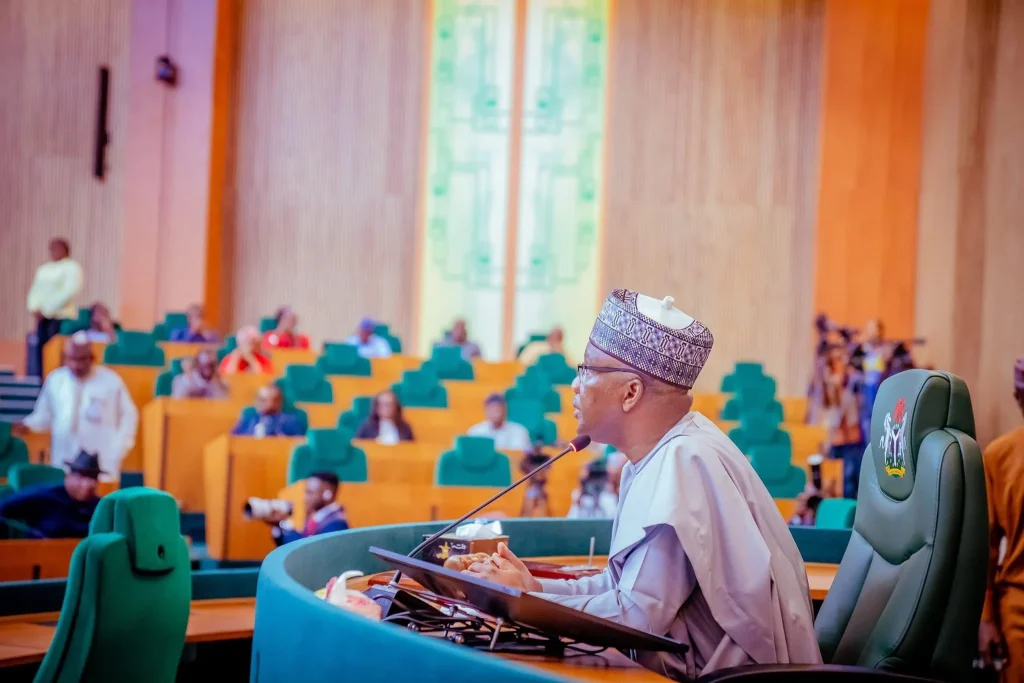A bill seeking to create 74 seats for women in the national assembly has passed second reading in the house of representatives.
The green chamber voted in favour of the bill during plenary on Tuesday, in a bid to encourage more female participation in politics.
Sponsored by Benjamin Kalu, the deputy speaker, and 12 other lawmakers, the proposed legislation seeks to alter Sections 48, 49, 71, and 117 of the constitution to create one “special seat reserved exclusively for women in the senate and house of representatives for each state of the federation and the federal capital territory (FCT)”.
The bill proposes to take effect after the term of the current national assembly elapses, and is subject to review every 16 years
The bill also proposes to alter Section 91 of the constitution to provide for three special seats “reserved exclusively” for women in houses of assembly of each state of the federation.
Leading the debate, Joshua Gana, co-sponsor of the bill, said the proposed legislation is aimed at addressing a “profound imbalance and the under-representation of women in the national assembly and at sub-national levels”.
He said the bill is “anchored on the fundamental principle of equitable representation, and aims to empower women by ensuring their voices are not only heard but that they actively contribute to shaping the legislative landscape, and the overall development of our nation”.
“The issue of gender equality and representation lies at the heart of our constitutional democracy,” he said.
Gana added that even though the constitution guarantees equal rights, the representation of women in the legislature has been “alarmingly low”.
“In the 7th, 8th, and 9th assemblies, women accounted for only 6.4%, 6.1%, and 2.7% of the senate respectively; and 6.4%, 3.05%, and 4.7% of the house of representatives respectively,” he said.
“These statistics underscore the urgent need for proactive measures to ensure equitable representation and amplify the voices of women in our legislative houses at the national and sub-national levels.
“The rationale behind this amendment is grounded on the principles of fairness and inclusivity.
“Globally, Nigeria lags behind in women representation in parliament, ranking among the lowest. Countries that have implemented affirmative action, like Rwanda and Andorra, have seen significant strides towards gender equality in governance.”
The legislator said the bill proposes a “temporary measure of seat reservation” for women to catalyse similar progress in Nigeria, “ensuring that women’s perspectives and priorities are fully integrated into our national and sub-national decision-making processes”.
‘BROAD CONSENSUS’
Contributing to the debate, Akin Rotimi, spokesperson of the house, said there is a “broad consensus” that it is necessary to have more women in parliament.
Kingsley Chinda, minority leader, supported the bill, saying parliament needs to correct the deficiency.
“We must make deliberate effort to solve problems where we see them,” he said.
Kelechi Nwogu from Rivers, corroborated Chinda’s argument, saying women should be given a “better opportunity” in politics.
Several other lawmakers who contributed to the debate, opposed the bill on the premise that it is against the provisions of the constitution on equal opportunity for all.
Ghali Tijani from Kano said rather than reserve special seats for women, political parties should deploy mechanisms to improve women’s participation in politics.
Olamijuwonlo Alao Akala from Oyo, Patrick Umoh from Akwa Ibom, and Billy Osawaru from Edo also opposed the bill, citing violations of the constitution.
Following the debate, Kalu proposed to withdraw the bill, noting that he may be biased as the lead sponsor since he was presiding.
“I will step down the bill until the day I am not presiding,” he said.
Ahmad Satomi from Borno countered Kalu, insisting that he should put the bill to a voice vote.
“It does not matter if you are presiding,” Satomi said.
Subsequently, Kalu put the bill to a voice vote. The “ayes” were louder than the “nays,” but he ruled in favour of the “ayes”.
A similar bill was considered in the 9th assembly during the constitution amendment process. The senate and house of representatives voted against it



